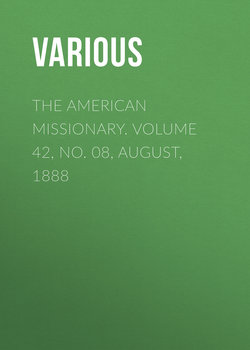Читать книгу The American Missionary. Volume 42, No. 08, August, 1888 - Various - Страница 5
*GETTYSBURG, FRATERNITY, FREE BALLOT.*
ОглавлениеThe meeting of the Blue and the Gray on the field of Gettysburg at the late anniversary celebration marks an era in national fraternity. The orator of the day, George William Curtis, did a noble, perhaps we might say courageous, deed in lifting the enthusiasm of the glad hour above the remembrance of past heroism and present harmony to the great duty of the nation—a free and fair ballot. A few lines culled from the oration will give the thought.
"The suffrage is the mainspring, the heart of our common life. If ignorance and semi-barbarous dominance be fatal to civilized communities, no less so is constant and deliberate defiance of law."
"No honest man can delude himself with the theory that this is a local question. If there be a national question, which vitally interests every American citizen from the Penobscot to the Rio Grande, it is the question of a free legal ballot."
"Can we wrest from the angel of this hour any blessing so priceless as the common resolution that we shall not have come to this consecrated spot only to declare our joy and gratitude, nor only to cherish proud and tender memories, but also to pledge ourselves to union in its sublimest significance?"
To this we add: The brave deeds of the soldier at Gettysburg, and the wise counsels of the orator, should be followed by the patient toil of the teacher and the preacher. It is hard to choose between the ballot withheld and the ballot cast by ignorance and vice. Blood and treasure flowed like water in the war. Shall treasure and toil be wanting for the work of peace—preparing the ignorant voter to cast the free ballot intelligently and honestly?
* * * * *
*A BOOM IN THE PRICE OF A SLAVE.*
One of our best educated and most efficient colored ministers in the South furnishes us the following sketch of his experience on the auction block. He not only was sold "early and often," but always at advancing prices. We do not wonder at this, for he has shown himself to be so valuable as a man, that we are sure the boy must have promised to be worth a great deal as a slave.
I was sold in 1862 at the age of ten years, for $400, by the widow B. of Virginia. As a rule, after the first sale, I was upon the auction block every day for three months. How often I was sold during those three months I cannot tell, but on Davis' auction block in his sale-room I was sold five times in one day. The last sale at the end of the three months was made in Tennessee, to the Rev. H.F.S., a Baptist minister, who paid $3,500 for his property. The Rev. Mr. S. was a "Yankee" from Philadelphia, Pa., and came South at the breaking out of the war.
* * * * *
